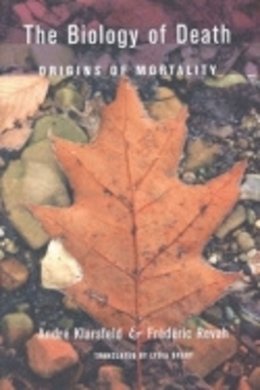
Stock image for illustration purposes only - book cover, edition or condition may vary.
The Biology of Death: Origins of Mortality
Andre Klarsfeld
FREE Delivery in Ireland
Description for The Biology of Death: Origins of Mortality
Hardback. Translator(s): Brady, Lydia. Num Pages: 240 pages, black & white illustrations. BIC Classification: PSA; PSX. Category: (G) General (US: Trade); (P) Professional & Vocational; (UP) Postgraduate, Research & Scholarly; (UU) Undergraduate. Dimension: 233 x 162 x 20. Weight in Grams: 466.
Why do we die? Do all living creatures share this fate? Is the body's slow degradation with the passage of time unavoidable, or can the secrets of longevity be unlocked? Over the past two decades, scientists studying the workings of genes and cells have uncovered some of the clues necessary to solve these mysteries. In this fascinating and accessible book, two neurobiologists share the often-surprising findings from that research, including the possibility that aging and natural death may not be forever a certainty for most living beings. André Klarsfeld and Frédéric Revah discuss in detail the latest scientific findings ... Read moreand views on death and longevity. They challenge many popular assumptions, such as the idea that the death of individual organisms serves to rejuvenate species or that death and sexual reproduction are necessarily linked. Finally, they describe current experimental approaches to postpone natural death in lower organisms as well as in mammals. Are all organisms that survive until late in life condemned to a "natural" death, as a consequence of aging, even if they live in a well-protected, supportive environment? The variability of the adult life span—from a few hours for some insects to more than a millennium for the sequoia and thirteen times that for certain wild berry bushes—challenges the notion that death is unavoidable. Evolutionary theory helps explain why and how some species have achieved biological mechanisms that seemingly allow them to resist time. Death cannot be understood without looking into cells—the essential building blocks of life. Intriguingly, at the level of cells, death is not always an accident; it is often programmed as an indispensable aspect of life, which benefits the organism as a whole. Show Less
Product Details
Publisher
Cornell University Press United States
Place of Publication
Ithaca, United States
Shipping Time
Usually ships in 7 to 11 working days
Reviews for The Biology of Death: Origins of Mortality
"The Biology of Death provides an engaging travelogue for aging and death, from ancient mythology, the swamps of vitalism and the higher roads of the 'Copernican revolution' of experimental gerontology, to today's Societé de Thanatologie with its fixation on the ontology of death. . . . The book's style and level of explanation are highly suitable for a general audience. ... Read moreThe broad overview of gerontological fact, fiction and theory is basically sound and provides a useful introduction to the perplexities of biological aging. . . . The Biology of Death belongs on the same shelf as other recent popular books on aging."—Nature, March 11, 2004 "Biology seems to reject the idea of the utility of natural death. Because the possibility of accidental death is never completely ruled out, the priority of living organisms cannot be to devote all of their efforts to their own survival; they must also keep resources to reproduce, to transmit their genes. Aging and natural death arise from this compromise, not automatically directly, but through the work of natural selection, as adverse side effects. Through The Biology of Death, these mechanisms are studied in a new vein that will enlighten the reader and expand their understanding of life and death from a cellular viewpoint."—Biology Digest 30:6, February 2004 "This book, by two French neuroscientists, relates the history of scientific and other ideas concerning death in an engaging and lucid account. Their reach encompasses some psychology and philosophy, as well as demography, comparative life histories, biochemistry, and evolution. . . . Klarsfeld and Revah's survey of aging across the biosphere is the book's best feature. . . . Evolutionary theories of aging are not idle abstractions, but provide essential guidance in a high-stakes game for medical advances that even now are pushing back against cardiovascular disease, cancer, and neurodegeneracy to extend our active and healthy life spans. These two neuroscientists have done an admirable job of collecting facts and explaining theories far from their core fields."—Joshua Mitteldorf, Temple University, The Quarterly Review of Biology, Volume 79 "Klarsfeld and Revah have written what could be called a popular book about an unpopular topic—death. . . . A fundamental human question permeates the discussion by Klarsfeld and Revah: Why do we fear mortality? The authors focus on the science that describes and explains the processes of aging preceding death. Science is an assault on ignorance (Ridley, 1991), and in new knowledge, wisdom can follow. This book, written (and beautifully translated) in an open style, will facilitate public discussion and awareness. It has the potential to reduce ignorance, to bring wisdom, and to reduce fear. . . . In their carefully detailed approach and reflections, Klarsfeld and Revah have served us bravely and well."—Charles R. Scriver, McGill University, American Journal of Human Biology (2004) "Authors André Klarsfeld and Frédéric Revah look upon aging and death as natural processes, involving mechanisms intrinsic to the life of all cells. They explain that methods may exist to delay and even eliminate some of the less desirable baggage of human aging. To the extent that death is demystified by reading this book, the fear of death by the reader may be lessened."—Antonie Blackler, Professor Emeritus, Molecular Biology and Genetics, Cornell University "I found The Biology of Death very well written, easy to read, and well documented, not only in terms of earlier concepts about this subject, but also up to date with the latest in molecular biology."—Roger Guillemin, Distinguished Professor, The Salk Institute for Biological Studies Show Less

